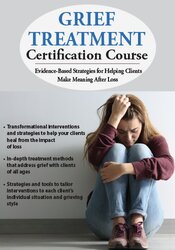

Your client’s world has been shattered following the loss of a loved one. Not only are they adjusting to these days and weeks without that person, but they are also struggling with changes to their sense of self.
Who are they now as they navigate this new world? Your client is stuck in a place of paralyzing sorrow, and you’re unsure of what else to do to help.
This is the perfect opportunity to get the tools that will transform the way you treat grieving clients, drastically increasing their well-being while reducing symptoms of complicated grief!
Watch expert Carla Archuletta, MA, LPC/MHSP-S, FT, NCC, as she guides you through the process of working with bereaved individuals and aiding them with making meaning after loss. She’ll use her extensive experience as a hospice grief counselor, trained end-of-life doula, and biomedical researcher to give you evidence-based counseling strategies appropriate for the treatment of multiple types of losses. You’ll also get the skills you need to tailor clinical interventions to the uniqueness of each client’s grief experience!
Best of all, upon completion of this training, you’ll be eligible to become a Certified Grief-Informed Professional (CGP) through Evergreen Certifications. Certifications. Certification lets colleagues, employers, and caregivers know that you’ve invested the extra time and effort necessary to understand the complexities of grief counseling. Professional standards apply. Visit for details. Purchase today to revolutionize your work with grieving clients!
CERTIFICATION MADE SIMPLE!
Attendees will receive documentation of CGP designation from Evergreen Certifications 4 to 6 weeks following the program.
*Professional standards apply. Visit for professional requirements.
Continuing education credit information is coming soon for this non-interactive self-study package.
CE hours may be available for select professions, as listed in the target audience. Hours will be dependent on the actual recording time. Please check with your state licensing board or organization for specific requirements.
There may be an additional fee for CE certificates. Please contact our Customer Service at 1-800-844-8260 for more details.
**Materials that are included in this course may include interventions and modalities that are beyond the authorized practice of your profession. As a licensed professional, you are responsible for reviewing the scope of practice, including activities that are defined in law as beyond the boundaries of practice in accordance with and in compliance with your professions standards.

Carla Archuletta, MA, LPC/MHSP, FT, NCC, is a highly sought-after speaker, clinician, author, and educator who specializes in death/dying, bereavement, trauma, oncology-related care, and end-of-life transitions. Carla’s integrative clinical approach is grounded in a strong scientific foundation, shaped by her early work in biomedical research and her role in oncology/hematology at Vanderbilt University where she focused on bone marrow for transplant in patients. Her extensive experience encompasses several years as a hospice grief counselor as well as being a trained end-of-life doula through the University of Vermont, further enriching her expertise in bereavement and end-of-life care.
Based in Brentwood, Tennessee, Carla operates a compassionate, evidence-based private practice with an unwavering commitment to guiding individuals and professionals through life’s most arduous emotional experiences. She also provides clinical services as a contract clinician affiliated with Gilda’s Club Middle Tennessee and Brentwood Counseling Associates. Carla is the coauthor of Health-Medical Challenges and Grief: Group EMDR Therapy for Patients and Caregivers, which is featured in EMDR Group Therapy: Emerging Principles and Protocols to Treat Trauma and Beyond (Springer Publishing).
Speaker Disclosures:
Financial: Charlotte Archuletta maintains a private practice and has employment relationships with Aletheia Behavioral Health, Brentwood Counseling Associates and Gilda’s Club Middle Tennessee. Charlotte Archuletta receives a speaking honorarium from 小蝌蚪视频. She has no relevant financial relationships with ineligible organizations.
Non-financial: Charlotte Archuletta is a member of the Association for Death Education and Counseling, EMDRIA International Association, NBCC, Tennessee Licensed Professional Counselors Association, and the Nashville Psychotherapy Institute.
Access never expires for this product.
Visit our FAQ page at www.pesi.com/faq or contact us at www.pesi.com/info
Satisfaction Guarantee
Your satisfaction is our goal and our guarantee. Concerns should be addressed to: PO Box 1000, Eau Claire, WI 54702-1000 or call 1-800-844-8260.
ADA Needs
We would be happy to accommodate your ADA needs; please call our Customer Service Department for more information at 1-800-844-8260.
小蝌蚪视频 Mobile App
Access CE trainings on your phone or tablet through our free mobile app. Choose video or audio-only versions of online courses from the world’s best instructors, and complete your CE requirements anywhere, anytime, at your own pace.
Please wait ...